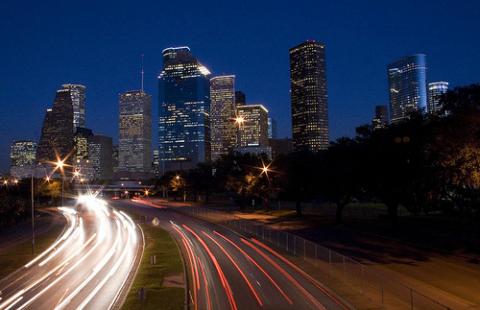Spurred on by industry from its bustling port and railroad connections, a 20th century oil boom, and later from diversification into aerospace (the Lyndon B. Johnson Space Center) and healthcare and biotechnology (the MD Anderson Cancer Center), the City of Houston has grown rapidly in population and economic output. Today, Houston is the fourth largest city in nation with a population of 2.1 million people and one of the youngest cities in the country. If measured as an independent nation, the size of its economy would rank as the world's 30th largest.
Houston has also steadily become more diverse. According to the U.S. Census, the city is 25 percent White, 44 percent Hispanic/Latino, 24 percent African American, and 7 percent Asian. The city has the third-largest Hispanic and third-largest Mexican population in the United States and more than 20 percent of the Houston metro area population were born outside the country. Of the foreign born population, one-fifth are originally from Asia. The city elected Lee Brown its first African American mayor in 1998 and elected Annise M. Parker in 2010 as only the city's second female mayor and as the first LGBT mayor of a major American city.
The city is also home to numerous wealth building initiatives and organizations. Since taking office in 2010, Mayor Parker has worked to repair the city's previously strained relationship with the U.S. Department of Housing and Urban Development (HUD) and transform Houston's Housing and Community Development Department. Utilizing joint technical assistance and capacity-building engagement, Houston and HUD will combine knowledge and resources to maximize the use of federal funds to revitalize neighborhoods, help the homeless, and produce more affordable housing.
Bank On Houston is another city led effort to help build assets for low-income families. An offshoot of the Bank On America program, Bank On Houston started when the City of Houston became the first city in Texas to sign up in May 2008. With an estimated 10 percent of the city unbanked, Bank on Houston is a collaborative effort that offers low-cost starter checking accounts to the unbanked, helping them begin the process of wealth and asset building. Setting a goal of 10,000 new checking accounts for the year of 2009, the effort surpassed that number in just three months. By June 2010, 40,000 had signed up. Individuals who signed up for accounts are also encouraged to take free financial literacy courses from non-profits, CDCs and credit unions such as People's Trust Federal Credit Union, the Credit Coalition, the Fifth Ward Community Redevelopment Corporation, the Alliance for Multicultural Community Services and the Houston Area Urban League.
Another collaborative wealth building initiative is Covenant Community Capital's "Smart Savers Program." Initially funded by a grant from the federal government in 2001, the partnership has expanded to include the City of Houston, the Houston Credit Coalition, several private banks, and a network of other community partners. To date, more than 600 low to moderate-income individuals have enrolled and 300 others have completed the program, purchasing a home or financing their education or a small business. Covenant has disbursed more than $1.2 million in match money at a 2:1 match rate.
An overview of community wealth building efforts follows:

